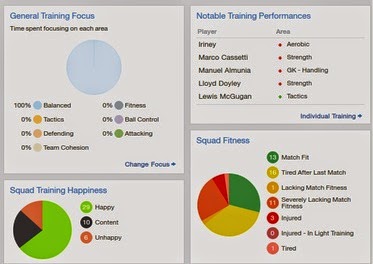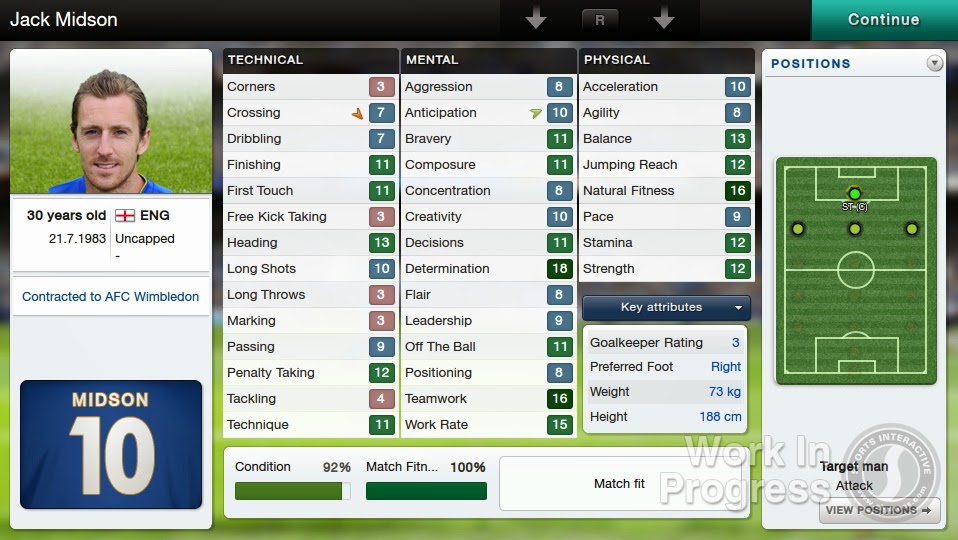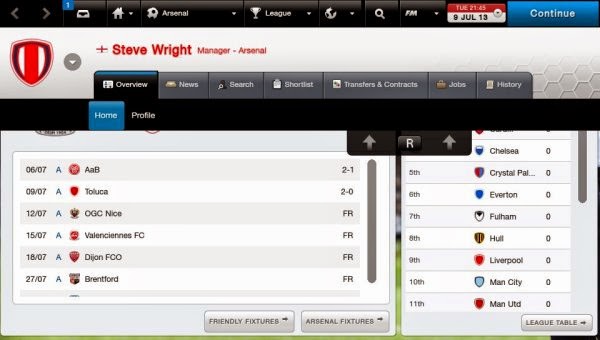 Review by Matt S.
Review by Matt S.
The Football Manager games have never had any right to be entertaining. Think about it; when we talk about hardcore simulation or strategy games, we often like to joke that they’re “spreadsheets;” a series of numbers and variables that can be manipulated to optimal effect. But with most games we’re joking. The spreadsheets of data are hidden in the background behind a pleasant interface and other abstractions.
But the soccer Football Manager games have always quite literally been spreadsheet games. They don’t even try and hide it. Each screen holds layer after layer of data and statistics, and it’s all laid out in such a manner that visually it looks like a clone of Excel. Just like learning how to make effective use of Excel takes years of training, mastering the complex interactions that occur when changing one variable and the effect that it will have on other variables takes a lot of work, skill, and patience.
The sheer weight of data that is housed within this latest game in the series also makes for a very clunky experience, where menus are cumbersome to work through, and the process of loading anything takes an age thanks to all the numbers that the game needs to crunch. The only break from the spreadsheet-and-waiting “action” is game day, where brief clips of the on-field action play out to show players directly how “their” team is performing. But these clips are hardly the most aesthetically pleasing experience either, with player models that would have looked dated on the Nintendo 64. Once it’s over players then head back to the spreadsheets to consider the ramifications of the team’s fine performance (or lack thereof).
Combine the facts that there’s no music, no voice commentary, and barely any art, and consider that this game is still well over 1GB to download, and that should tell you just how much data and statistics this game needs to crunch. It’s intimidating at times just how much there is to wade though, and I can’t help but think that perhaps after a successful season, my Vita should spit out a degree in statistics, as I feel like successfully navigating the game is qualifying me to run a bank.
So, yes, Football Manager Classic 2014 has no right to be entertaining. And yet there I was, completely entertained.
I haven’t played any of the Football Manager games prior to this one in enough depth to be able to compare what this one does better or worse than previous editions, but I have a vague idea of what’s always been on offer, and Classic 2014 offers all of that again. Players pick their favourite soccer team from a truly startling range around the world, and then set about the task of maximising that team’s results in local competitions, improving the skills of the players, and keeping an eye out for more lucrative offers from bigger clubs for them to manage.
From the relatively straightforward (negotiating renewed contracts with key players, while signing new transfers, while also managing the wage budget), to the long-term complex management strategies of creating a vibrant youth environment to train and discover new stars for future years of competition, Football Manager requires players to manage the immediate need of delivering short-term results, while preparing the club for long term success.
Teams will also be plagued by injury, and the top players will be regularly called on for international duty, meaning that on any given game, you’ll need to have second or even third-tier players ready to pull up from the reserves and put into key matches, and then have strategies on hand to compensate for these player’s relative weaknesses. Perform badly, and a sacking is on the cards.
There’s a lot of management to take into account here and there have been times I’ve played for three or four hours and only progressed through one game of soccer has been played in that period. But there is a certain sensation of ownership and thrill that hits at a certain point deep into a season as you watch early strategies and tough decisions which initially cost the club some wins, start to come together and young players start to hit some real form. A dozen or so hours in and the complete immersion within numbers and human resource management starts to become very addictive indeed. It’s a very cerebral kind of excitement, but I found myself watching those ugly little character icons running around taking desperate shots at goal with sweaty hands. I was powerless to affect the results once the game had been joined, as I couldn’t do much more than watch, call in substitutions, and yell broad tactical changes from the sidelines, but I was invested in the performance of this team in a way that I’ve never experienced in any soccer game before; even the likes of FIFA where I would get hands-on and take control of the entire team personally.
If all the above words haven’t made this explicitly clear already: Football Manager is a niche game, and not for casual fans of the sport. It’s for the people that read the soccer news, that care what a team manager has to say, that follows the transfer season and has a fantasy league team. Football Manager is for people that care for an excess in spreadsheets and data, and for all its shoddy presentation and poor optimisation on the Vita, it’s absolutely brilliant at all of that.
– Matt S.
Editor-in-Chief
Find me on Twitter: @digitallydownld










